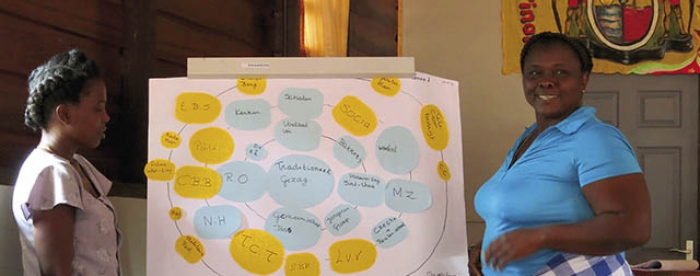Duurzaam bosbeheer voor dorpsontwikkeling
Duurzaam gebruik van gemeenschapsbossen zal bijdragen aan de ontwikkeling van de binnenlandse dorpsgemeenschappen in Suriname en het lange termijn onderhoud van de ecosysteemdiensten die deze bossen bieden. Het Ministerie van Regionale Ontwikkeling (RO) heeft het mandaat om regionale en dorpsontwikkeling en verbetering van het levensonderhoud van de inheemse en tribale gemeenschappen in het binnenland van Suriname te ondersteunen, en had de middelen en het vermogen om deze ondersteuning te bieden, nodig.
Tropenbos International Suriname ontwikkelt samen met Hogeschool Van Hall Larenstein een project om een op maat gemaakt trainingsprogramma aan te bieden voor 'Duurzaam bosbeheer voor dorpsontwikkeling', gericht aan personeelsleden van RO en vertegenwoordigers van de dorpsgemeenschappen.
Het project zal de door Tropenbos Colombia ontwikkelde methodologieën gebruiken voor het ontwikkelen van trainingsprogramma's in interculturele contexten. Het proces begint met overleg tussen RO en het dorp over de behoeften van het dorp en wat RO kan doen om deze behoeften tegemoet te komen. Door middel van een beoordeling van het dorp en zijn omgeving resulteert het proces in een gezamenlijk geformuleerd ontwikkelingsplan voor gemeenschapsbossen en de inleidende formulering van lokaal gestuurde, op natuurlijke hulpbronnen gebaseerde, economische en duurzame kleinschalige projecten die de dorpsontwikkeling ondersteunen.
Aan het einde van het project zullen de vaardigheden van de deelnemers over kwesties zoals degelijke besluitvorming en beleidsplanning worden verbeterd. Verder zullen de deelnemers kennis opdoen en vaardigheden ontwikkelen die nodig zijn om dorpsgemeenschappen te helpen hun behoeften kenbaar te maken, advies te geven en gezamenlijk lokale kleinschalige ontwikkelingsprojecten mee te ontwikkelen. Bovendien kunnen dorpelingen beter onderhandelen met houthakkers, conflicten oplossen en gemeenschapsbossen beheren.
Gemeenschapsbossen die op een duurzame manier worden beheerd, zijn niet alleen goed voor de lokale gemeenschappen, maar ook voor de samenleving in het algemeen, omdat de verschillende activiteiten voor de exploitatie van landbouw en houtkap in het bos kunnen worden gereguleerd en duurzaam kunnen zijn. Suriname zal ook beter in staat zijn de verplichtingen ten opzichte van wereldwijde verdragen inzake klimaatverandering en biodiversiteit beter na te komen.
